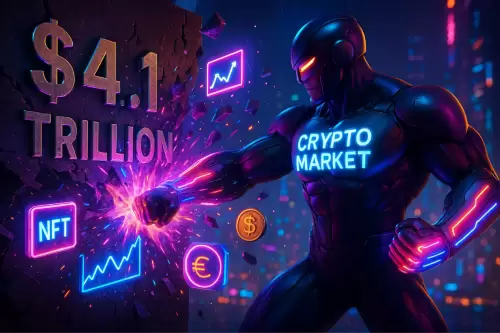 |
|
 |
|
 |
|
 |
|
 |
|
 |
|
 |
|
 |
|
 |
|
 |
|
 |
|
 |
|
 |
|
 |
|
 |
|
在新当选的总统李·蒙蒙(Lee Jae-Myung)的领导下,执政的民主党推出了《数字资产基本法》。

South Korea is set for a dramatic reshaping of its digital asset landscape, potentially positioning itself as a global leader in cryptocurrency regulations.
韩国将重塑其数字资产格局,并有可能将自己定位为加密货币法规的全球领导者。
This transformation is unfolding rapidly with the ruling Democratic Party, headed by President Lee Jae-myung, introducing the Digital Asset Basic Act. The aim is to enhance transparency and foster competition within the crypto sector.
由总统李·詹·蒙(Lee Jae-Myung)领导的执政民主党在迅速发展,引入了《数字资产基本法》。目的是提高加密货币部门内的透明度和促进竞争。
A cornerstone of this ambitious plan is the clear intent to facilitate stablecoin use and issuance.
这个雄心勃勃的计划的基石是明确的意图,目的是促进稳定使用和发行。
South Korea pushes for stablecoin regulations
韩国推动稳定法规
韩国推动稳定法规
Notably, President Lee’s campaign promise to permit domestic stablecoin issuance is now rapidly translating into concrete policy.
值得注意的是,李总统的竞选承诺允许国内稳定发行签发,现在正在迅速转化为具体政策。
This proactive and defined approach to digital asset governance raises a crucial question – Will South Korea’s upcoming regulatory framework grant it a distinct competitive advantage over nations like the United States in the evolving global crypto industry?
这种积极且定义的数字资产治理方法提出了一个至关重要的问题 - 韩国即将到来的监管框架是否会给它与像美国这样不断发展的全球加密货币行业这样的美国具有独特的竞争优势吗?
Commenting on the same, Lee said,
李说,对此发表评论,
“We need to establish a won-backed stablecoin market to prevent national wealth from leaking overseas.”
“我们需要建立一个赢得的稳定稳定市场,以防止国民财富泄漏在海外。”
Additionally, beyond its significant focus on stablecoins, South Korea has been demonstrating a broader commitment to integrating cryptocurrencies into its financial landscape.
此外,除了其对稳定剂的重大关注之外,韩国还表现出更广泛的承诺,将加密货币整合到其金融景观中。
For this, President Lee Jae-myung’s administration is now exploring various avenues. Including a proposal for the country’s national pension fund to consider Bitcoin [BTC] and other crypto investments.
为此,总统李·钟(Lee Jae-Myung)的政府现在正在探索各种途径。包括该国国家养老基金的提案,以考虑比特币[BTC]和其他加密投资。
Furthermore, the nation is actively investigating the feasibility of establishing a dedicated Bitcoin reserve.
此外,该国正在积极调查建立专用比特币储备的可行性。
What’s more to the bill?
该法案还有什么?
South Korea has already begun to amend its anti-money laundering (AML) regulations, with the explicit goal of encouraging greater participation from foreign investors within its domestic crypto market.
韩国已经开始修改其反洗钱(AML)法规,其明确的目标是鼓励外国投资者更多地参与其国内加密货币市场。
Hence, as nations worldwide grapple with the complexities of digital asset regulation, both the United States and South Korea are taking decisive steps to establish clear legal frameworks for stablecoins, albeit with distinct philosophies.
因此,随着全球与数字资产监管的复杂性的努力,美国和韩国都在采取果断的步骤,以建立明确的法律框架,为稳定的稳定框架,尽管具有独特的哲学。
In the U.S, the GENIUS Act, currently undergoing a crucial Senate vote, primarily targets payment stablecoins.
在美国,目前接受重要参议院投票的《天才法》主要针对付款稳定。
It proposes a dual regulatory model, with federal oversight for large issuers boasting over $10 billion in circulation and state-level management for smaller entities. This approach aims to provide clarity without encompassing the entire spectrum of digital assets.
它提出了一种双重监管模型,对大型发行人的联邦监督拥有超过100亿美元的发行和较小实体的州级管理。这种方法旨在提供清晰度,而不包含整个数字资产范围。
Conversely, South Korea’s Digital Asset Basic Act, championed by President Lee Jae-myung, adopts a more sweeping approach. It intends to regulate a broader range of digital assets, including asset-linked tokens beyond just payment stablecoins, all covered by a comprehensive digital finance umbrella.
相反,由李·蒙(Lee Jae-Myung)总统倡导的韩国数字资产基本法案采用了一种更加广泛的方法。它打算规范更广泛的数字资产,包括与资产相关的代币,而不仅仅是付款稳定的,所有这些都是由全面的数字金融伞所涵盖的。
How is it different from the U.S GENIUS Act?
它与《美国天才法》有何不同?
While both legislative efforts mandate licensing requirements and seek to promote safer stablecoin adoption, their implementation strategies diverge significantly.
尽管这两项立法努力都授权许可要求并试图促进采用更安全的稳定者,但其实施策略却大大不同。
South Korea centralizes all stablecoin issuance approval under its Financial Services Commission, a move that promises consistency but has drawn criticism from the Bank of Korea for concentrating regulatory power.
韩国将所有Stablecoin发行批准集中在其金融服务委员会下,此举有望保持一致性,但已引起韩国银行对集中监管权力的批评。
In contrast, the GENIUS Act introduces a more decentralized model, allowing for state-level regulation where appropriate.
相比之下,《天才法》引入了一个更加分散的模型,可以在适当的情况下进行状态级别的调节。
Furthermore, a key difference lies in consumer protection specifics. The U.S. bill includes stringent transparency requirements, anti-fraud measures, and explicit mandates for anti-money laundering and know-your-customer compliance.
此外,关键区别在于消费者保护的细节。美国法案包括严格的透明度要求,反欺诈措施以及针对反洗钱和了解自己的遵守情况的明确要求。
While South Korea’s bill emphasizes transparency and reserve guarantees, it currently lacks the detailed rules around user-facing protections found in its American counterpart.
尽管韩国的法案强调透明度和储备保证,但目前缺乏有关其美国同行中面向用户的保护的详细规则。
免责声明:info@kdj.com
所提供的信息并非交易建议。根据本文提供的信息进行的任何投资,kdj.com不承担任何责任。加密货币具有高波动性,强烈建议您深入研究后,谨慎投资!
如您认为本网站上使用的内容侵犯了您的版权,请立即联系我们(info@kdj.com),我们将及时删除。
-

- 哈萨克斯坦的加密飞跃:比特币ETF和中亚的数字融资未来
- 2025-08-13 11:59:45
- 哈萨克斯坦通过现场比特币ETF和创新营销在中亚的加密货币场景中大放异彩。看看它的影响。
-

-

-

- 比特币的疯狂骑行:集会,回调,接下来是什么
- 2025-08-13 09:00:19
- 比特币最近在回调之前飙升至122,000美元。检查市场量和链上数据,揭示了对比特币集会和潜在未来的见解。
-

- 比特币,Bitmax和机构需求:加密投资的新时代
- 2025-08-13 08:58:33
- 探索Bitmax的比特币扩展和更广泛的机构采用如何重塑加密货币景观,这是由战略投资和不断发展的法规驱动的。
-

-

- 乘坐加密浪潮:NFTS,DEFI和市场高4.2吨
- 2025-08-13 08:30:46
- 探索加密货币市场的最新趋势,包括NFTS的激增,Defi Innovations和主要见解,推动了该市场的售价4.2吨。
-

- 冷钱包:现金返还,加密货币和像老板一样的汽油费
- 2025-08-13 08:20:49
- 冷钱包改变了游戏。获得汽油,掉期等的现金返还。这是我们所知道的高加密费的终结吗?让我们潜入!
-































































